by University of Texas Health Science Center at Houston Scientists have found a way to distinguish between two progressive neurodegenerative diseases, Parkinson’s disease (PD) and multiple system atrophy (MSA), using a technology developed by a researcher at The University of Texas Health Science Center at Houston (UTHealth). The discovery was published today in Nature. It is...
Tag: <span>parkinsons</span>
Parkinson’s: New treatment targets two nerve systems at once
Scientists have found that a technique for targeting a specific group of brain cells associated with Parkinson’s disease is also effective at treating a separate group of brain cells. Researchers may have found a new two-pronged treatment approach to Parkinson’s disease. These findings now appear in the journal Neurotherapeutics. The initial technique is a type...
New study could ‘drastically’ change how we understand Parkinson’s
The hallmark symptoms of Parkinson’s disease are motor symptoms that include shaking hands and slowness of movement, but specialists still do not entirely understand what causes this disease. Newly published research may now overturn prevailing notions about key Parkinson’s mechanisms. Motor symptoms in Parkinson’s disease may be due to brain changes that take place earlier...
Parkinson’s symptoms improve with weekly regimens of both physical and cognitive exercises
Parkinson’s patients’ motor and non-motor symptoms were improved with a weekly exercise regimen that included physical and cognitive tasks, according to new research presented today (18 December) at The Physiological Society early career conference, Future Physiology 2019: Translating Cellular Mechanisms into Lifelong Health Strategies. Parkinson’s Disease is a chronic neurodegenerative disease that can lead to...
Woman is first to receive cornea made from ‘reprogrammed’ stem cells
The Japanese woman’s vision has improved since the transplant, say her doctors. At a press conference on 29 August, ophthalmologist Kohji Nishida from Osaka University, Japan, said the woman has a disease in which the stem cells that repair the cornea, a transparent layer that covers and protects the eye, are lost. The condition makes vision blurry and can lead to blindness....
Parkinson’s disease may originate in the intestines
by Mette Louise Ohana, Aarhus University In 2003, a German neuropathologist proposed that Parkinson’s disease, which attacks the brain, actually might originate from the gut of the patients. Researchers from Aarhus have now delivered decisive supportive evidence after seeing the disease migrate from the gut to the brain and heart of laboratory rats. The scientific...
Neuronal Parkinson inclusions are different than expected
by University of Basel An international team of researchers involving members of the University of Basel’s Biozentrum challenges the conventional understanding of the cause of Parkinson’s disease. The researchers have shown that the inclusions in the brain’s neurons, characteristic of Parkinson’s disease, are composed of a membranous medley rather than protein fibrils. The recently published study in Nature Neuroscience raises new questions about the...
Inflamed monkey guts produce Parkinson’s-related proteins
by Chris Barncard, University of Wisconsin-Madison The intestinal linings of monkeys with inflamed bowels show chemical alterations similar to abnormal protein deposits in the brains of Parkinson’s patients, lending support to the idea that inflammation may play a key role in the development of the degenerative neurological disorder. A study published by University of Wisconsin–Madison researchers today in the Journal of...
Virtual reality offers benefits for Parkinson’s disease patients
Researchers are reporting early success with a new tool to help people with Parkinson’s disease improve their balance and potentially decrease falls with high-tech help: virtual reality. After practicing with a virtual reality system for six weeks, people with Parkinson’s disease demonstrated improved obstacle negotiation and balance along with more confidence navigating around obstacles in...
A gentle method for unlocking the mysteries of the deep brain
The electroencephalogram records the electrical activity of the brain in a non-invasive way using 256 electrodes placed on the scalp. Thanks to mathematical algorithms combined with anatomical imaging, we can see what is happening in the deepest part of our brain, without having to enter it directly. Credit: UNIGE The subcortical areas of the brain, situated in its deepest...


